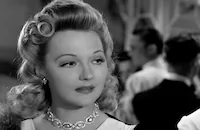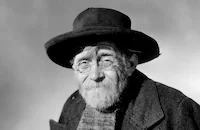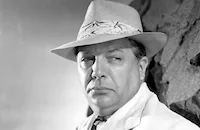It Could Happen to You
Cast & Crew
Phil Rosen
Alan Baxter
Andrea Leeds
Owen Davis Jr.
Astrid Allwyn
Walter Kingsford
Film Details
Technical Specs

Synopsis
Kindly Max Barrett, known to everyone as "Pa," is the proud owner of a candy store frequented by the other immigrants living in his New York East Side neighborhood. Pa's son Fred, an aspiring lawyer, has been reared with Bob Ames, an orphan whom Pa took in as a child. Bob works in a bookie's office with his former girl friend Angela, but aspires to a better life. When Professor Schwab announces that he is retiring from running the Foreign American institute, at which immigrants can learn how to become good American citizens, Bob sees his chance. In order to buy the school from Schwab, Bob attempts to pull a scam at the race track with Angela, but they are found out by their employer and dismissed. Desperate to obtain the money, Bob remembers the $600 showed to him by Pa, who has saved it to set up Fred in his own office. On the night of Fred's graduation from law school, Bob robs the candy store. Pa, who has forgotten his ticket to the commencement exercises, returns to the store and is killed by Bob, who does not recognize him until it is too late. The crime goes unsolved, but Laura Compton, Bob and Fred's childhood friend, with whom they are both in love, tells the police that one of the stolen bills was torn and repaired with tape. Schwab recognizes the bill as one with which Bob paid for the institute, and blackmails him into taking him on as a partner. Schwab then forces Bob to turn the school into a racket that threatens neighborhood immigrants with deportation if they do not attend the school and pay the five dollars-a-week tuition. The immigrants are furious with the deal, and Bob grows despondent over having to betray his lifelong friends. Tired of Angela, who is still in love with him, Bob tries to get Schwab to dismiss her, and she angrily tells the police the truth about Pa's murder. Refusing to believe that his friend could be guilty, Fred defends him and convinces the jury that the most damning evidence, Bob's fingerprints on the cookie jar containing Pa's money, is a natural result of Bob having grown up with the Barretts. After he is acquitted, Bob orders Schwab to leave the country, telling him that because he has been acquitted once, he cannot be tried again and is therefore free of Schwab's power over him. Schwab threatens to show the incriminating bill to Fred and Laura, and while the men argue, they are involved in a car accident, and Schwab is killed. Bob then goes to the institute, where he meets Fred and Laura. As they are talking, the angry students, fed up with the racket, storm the school and threaten to lynch Fred and Bob. Hoping to save Fred, Bob climbs to the roof and confesses that he murdered Pa and engineered the racket. The mob still threatens Fred, despite Bob's pleas that his friend is innocent, and so to convince them, Bob jumps from the building. Later, after Bob's funeral, Fred and Laura console each other with the knowledge that the school, now called the Max Barrett Institute, will be run legitimately.

Director
Phil Rosen
Cast

Alan Baxter

Andrea Leeds

Owen Davis Jr.

Astrid Allwyn

Walter Kingsford
Al Shean

Christian Rub
Else Janssen
Edward Colebrook
Stanley King
Nina Campana
Frank Yaconelli

John Hamilton
Paul Stanton
Bob Murphy

Cy Kendall
Robert Anderson
Bert Sprotte
Sada Simmons
Hans Joby
Betty Holt
Leonard Kibrick
Mickey Martin

Jack Carson

Yakima Canutt
Leon Werner
Joan Havard
Charles Mcavoy
Rodney Hildebrand
Ed Schaefer
Sam Flint
Grace Hayle
Dirk Thane

William Castle
Richard Beach

Robert Parrish
Rolf Ernest
George Magrill
Carleton Young
Frank Wayne
Hans Von Morhart
Walter Thiele
Hedwiga Reicher
James Sarno
Jack Kenny
Harry Semels
Adolph Milar
Max Etzkorn
Dina Smirnova
Victor De Linsky
Morgan Brown
Martha Bamattre
Harrison Greene
Crew
Alberto Colombo
Eloise
Leonard Fields
Phil Ford
Terry Kellum
Jack Marta
Ernest Nims
Samuel Ornitz
Murray Seldeen
Nathanael West
Nathanael West
Clarence Wheeler

Film Details
Technical Specs

Quotes
Trivia
Notes
The working titles of this film were Gangs of New York and It Might Happen to You. Gangs of New York was also the title of a 1938 Republic film, directed by James Cruze, that was about New York gangsters. Republic bought a novel by that title in April 1936 and some news items in late 1936 could be referring to either the 1937 film It Could Happen to You or the 1938 film Gangs of New York as both films were apparently known by the latter title during that period. According to the MPAA/PCA Collection at the AMPAS Library, the PCA rejected two early versions of the screenplay because they violated a resolution adopted by the PCA Board of Directors that prohibited portrayals of "the activities of American gangster armed and in violent conflict with the law, or law-enforcing officers." Once the gangster elements were removed and the violence toned down, the script was approved. A Hollywood Reporter news item reported that "sideline musician" Harold Sorenson died while working on the picture.












